Q: PFSH Leveling in EM Coding – “Can you go over how to level PFSH in EM coding? On your form you show 1-2 is pertinent and 3 is complete but if it is an established patient 2-3 is considered complete.”
A: I know, very confusing. I’m going to admit something, this did not actually come from the chat question; I put it in here, it came from a student today, hot off the press, I said, “Let me put that as one of the first chat questions and let’s see if I and the team can answer this.” I did quickly find a link for this at EMUniversity.com (http://emuniversity.com/PFSH.html) which is one of my favorite sites for things related to E/M.
Past Family Social History is part of history.
There are three parts to history, the HPI (History of Present Illness), ROS (Review of Systems), and PFSH. But a lot of people don’t realize that the leveling of it or the scoring of it changes based on whether or not the patient is established or if it’s an ER visit, or if it’s a subsequent nursing facility, etc. That’s what the person was asking about because sometimes when people will say it on a seminar or at a Medicare training, they will only say it one way. When in reality, it’s one item from two out of three of the Past Family Social History components, and the component is past history, social history, family history. Those are the three components.
VIDEO: How to Level PFSH in EM Coding

If you think of a little checkbox:
- Did your documentation say anything about the patient’s past history? Check.
- Anything about social history, their work, that sort of thing? Check.
- Family history – history of cancer. Check.
If you can check one item from 2 out of 3 PFSH components, then it can be documented as a complete for these E/M sub-categories. You need at least one specific item from 3 of the 3 components to be considered a complete for these E/M sub-categories. That’s what I had to share it is different. The student was thinking that someone was telling her one thing, we were telling her another, when actually it’s the same thing, it’s just maybe glossed over in other areas.
Chandra: I just wanted to chime in that we got a related question on the chat asking if the provider asked whether or not a patient speaks Spanish, can that be taken as social history? If you’ll scroll up ever so slightly, those 7 elements that are listed there are the 7 that they suggest for social history: marital status, living arrangements. Obviously, it comes down to whether or not it’s pertinent and significant for that patient.
For example, like in a newborn if it says single. Really? We would kind of expect that, unless there’s some sort of arranged marriage or something we’re not sure about. So, most insurance carriers will say, “Marital status on a newborn doesn’t count because we expect them to be single.” That’s not pertinent to their current livelihood.
From the aspect of what languages they speak, if that’s pertinent, if that’s going to require us to think about whether or not there’s an interpreter, or it leads to what they do for a living and what’s involved. I would say, absolutely, that could be included as pertinent, relevant significant social history.
Alicia: I think that’s a good point.
Laureen: I was talking to a friend of mine, Susan Hoffman, who is like an E/M guru and she has worked in training physicians for many, many years and I asked her how does she explain it? She says, “The formula is this: In order to bill the highest level of service, they need to mention at least one item in each of the histories for new patients, and one item in two histories for established patients.” I’m going to copy that and paste that in the chat. I just saw it, I said, “Oh! I like that.”
Alicia: It’s always good to have people to network with.
Laureen: Yes, definitely! Honestly, when you become a student of ours, you are networked in with us. We have a great network, I’m so proud of our support groups for our blitzes and our coding classes, very supportive of each other. We jump in but it’s really, you’ve got a little network there and pointing each other the resources, it’s really awesome.
Related How to Level PFSH in EM Coding Posts:
- EM Codes 99201 99205 – EM Coding Question
- BHAT Manuals | Bubble Highlight & Annotate Technique by Laureen Jandroep
- Coding Alcohol and Smoking Dependence vs. Severe Use Disorder

![[CCO] Certification Coaching Organization LLC [CCO] Certification Coaching Organization LLC](https://www.cco.us/wp-content/uploads/2015/05/CCO-Logo-2015-d3-500px.png)
Love your story, You are one smart cookie. how many kids are adopted?